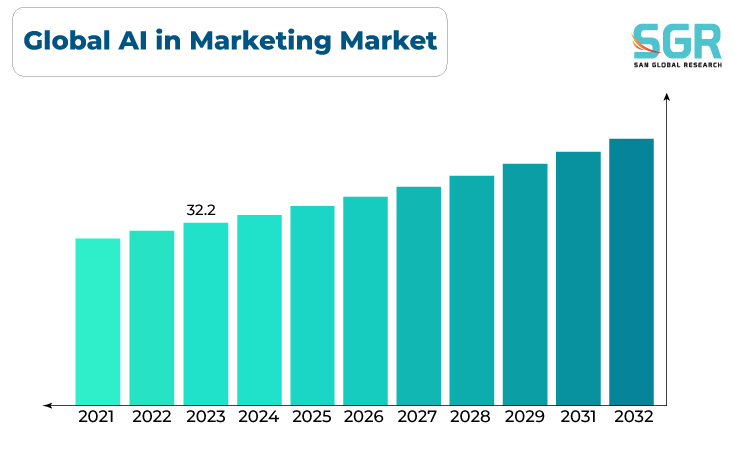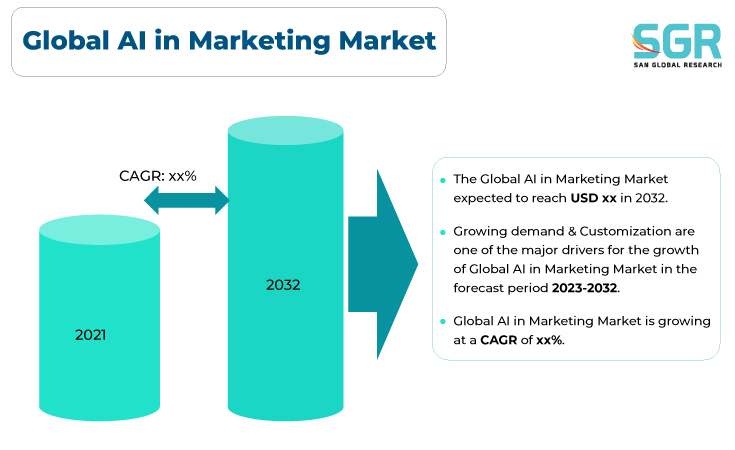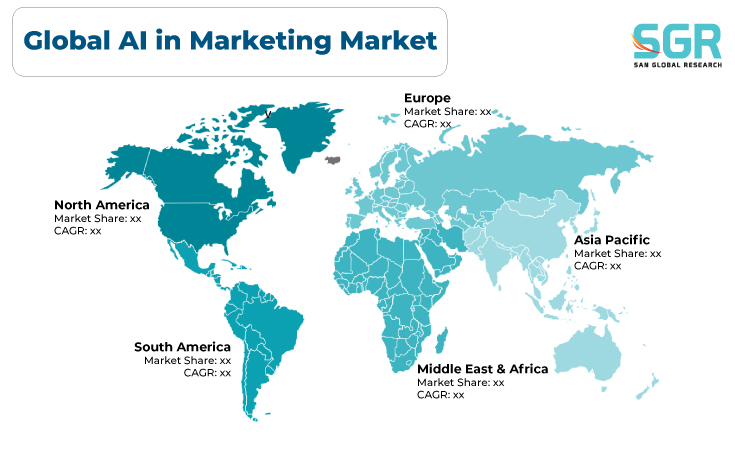Global AI in Marketing Market is estimated to be worth USD 32.2 Billion in 2022 and is projected to grow at a CAGR of 26.4% between 2023 to 2032. The study has considered the base year as 2022, which estimates the market size of market and the forecast period is 2023 to 2032. The report analyzes and forecasts the market size, in terms of value (USD Billion), for the market. The report segments the market and forecasts it by offering, by deployment type, by application, by technology, by end user and region/country.

The Global AI in Marketing market represents a dynamic fusion of artificial intelligence (AI) technology and marketing strategies, revolutionizing how businesses engage with consumers and optimize their marketing efforts. AI's integration in marketing facilitates data-driven decision-making, enabling companies to leverage predictive analytics, personalized customer experiences, and targeted campaigns. AI-powered tools, such as machine learning algorithms and natural language processing (NLP), empower marketers to analyze vast volumes of data, extract actionable insights, and predict consumer behavior with greater accuracy. This technology enables the automation of repetitive tasks, precise audience segmentation, dynamic content creation, and real-time campaign optimization across various marketing channels. As businesses increasingly prioritize personalized and data-centric approaches, the Global AI in Marketing market continues to expand, offering innovative solutions that drive efficiency, enhance customer engagement, and deliver measurable ROI in today's highly competitive landscape.

Region Wise Comparison:
North America, especially the United States, has been a significant hub for AI technology adoption in marketing. The region boasts a mature tech ecosystem and a strong focus on innovation, leading to extensive AI integration across marketing functions.
European countries, including the UK, Germany, and France, have also shown significant advancements in AI adoption for marketing purposes. There's a growing trend of AI-powered analytics, personalized content delivery, and customer engagement strategies in the region.

Countries in the Asia-Pacific region, such as China, Japan, South Korea, and India, have witnessed increasing AI adoption across various industries, including marketing. Emerging economies in this region are progressively leveraging AI to enhance marketing strategies and customer experiences.
While perhaps not as prominent as other regions, certain Latin American countries, like Brazil and Mexico, have started adopting AI technologies in marketing to optimize digital campaigns, customer segmentation, and analytics.
Adoption rates in the Middle East and Africa might be more nascent compared to other regions. However, the potential for growth exists as businesses increasingly explore AI-powered marketing tools and analytics to gain a competitive edge.

Segmentation
The Global Artificial Intelligence in Marketing Market is segmented by offering, by deployment type, by application, by technology, by end user and region/country.
By Offering:
- Based on the offering, the Global Artificial Intelligence in Marketing Market is bifurcated into Hardware, Software & Services – where the Software is dominating and ahead in terms of share.
- Software in the AI in Marketing market serves as the backbone of innovative and data-driven strategies, empowering businesses to revolutionize their marketing approaches. AI-powered software tools leverage machine learning algorithms, natural language processing (NLP), and predictive analytics to analyze vast volumes of data and derive actionable insights. These tools enable marketers to personalize customer experiences, optimize campaigns, and automate various marketing tasks, ultimately enhancing efficiency and driving better ROI. Software applications encompass diverse functionalities, including customer segmentation, recommendation engines, chat bots for customer interactions, predictive modeling, sentiment analysis, and dynamic content creation.
By Deployment Type:
- Based on the Deployment Type, the Global Artificial Intelligence in Marketing Market is bifurcated into Cloud & On Premises – where Cloud is dominating and ahead in terms of share.
By Application:
- Based on the Application, the Global Artificial Intelligence in Marketing Market is bifurcated into Social Media Ad, Search Ad, Dynamic Pricing, Virtual Assistant, Content Curation, Sales & Marketing Automation, Analytics Platform and Others – where the Social Media Ad is dominating and ahead of others in terms of share.
By Technology:
- Based on the Technology, the Global Artificial Intelligence in Marketing Market is bifurcated into ML, Context Aware Computing, NLP & Computer Vision – where ML is dominating and ahead of others in terms of share.
By End User:
- Based on the End User, the Global Artificial Intelligence in Marketing Market is bifurcated into BFSI, Retail, Consumer Goods, Media & Entertainment, Enterprise and Others – where the BFSI is dominating and ahead of others in terms of share.

On the basis of region
- North America
- Europe
- Asia Pacific
- South America and
- Middle East and Africa
In 2022, North America is anticipated to dominate the Global Artificial Intelligence in Marketing Market with market revenue of XX USD Million with a registered CAGR of XX%.
Key Players:
The key market players operating in the Global Artificial Intelligence in Marketing Market include.
- NVIDIA
- INTEL
- IBM
- MICRON
- SAMSUNG
- XILINX
- AMAZON
- ALPHABET
- MICROSOFT
- SALESFORCE
- BAIDU
Drivers:
Growing sector across the globe
The AI in Marketing market is propelled by several key drivers that fuel its continuous growth and evolution. Firstly, the increasing availability and accumulation of vast volumes of data from multiple sources serve as a primary driver. This data influx enables AI-powered tools to analyze and derive valuable insights, empowering marketers to make data-driven decisions and personalize customer experiences effectively. Secondly, the growing demand for personalized and targeted marketing approaches fuels the adoption of AI technology. AI's ability to segment audiences, predict behavior, and deliver tailored content or recommendations resonates with businesses aiming to enhance customer engagement and satisfaction. Additionally, the proliferation of digital channels and the need for real-time responsiveness have pushed companies to invest in AI-driven automation for campaign management, customer service, and lead generation, fostering market growth. Furthermore, the continuous advancements in AI technology, including machine learning algorithms and natural language processing, drive innovation in marketing strategies, encouraging further adoption of AI solutions. These drivers collectively signify a dynamic shift towards AI integration in marketing practices, empowering businesses to optimize their marketing efforts, improve customer interactions, and gain a competitive edge in the rapidly evolving market landscape.
Opportunity:
Evolving Market
The AI in Marketing market presents a wealth of opportunities for businesses seeking innovative and efficient ways to engage customers and enhance their marketing strategies. One of the significant opportunities lies in leveraging AI-powered tools to personalize customer experiences. AI enables marketers to analyze vast datasets, understand consumer behavior patterns, and deliver highly targeted and personalized content, thereby fostering stronger connections and increasing customer loyalty. Furthermore, the integration of AI technologies, such as machine learning and predictive analytics, presents opportunities for precise audience segmentation and predictive modeling, enabling businesses to anticipate customer needs and preferences. Another promising opportunity emerges from the increasing adoption of conversational AI, like chat bots and virtual assistants, to improve customer interactions and provide real-time support, enhancing overall customer satisfaction. Additionally, the utilization of AI for marketing automation, such as automating repetitive tasks, optimizing ad campaigns, and generating actionable insights from data, presents opportunities for operational efficiency and cost savings. As AI technology continues to evolve and businesses seek more sophisticated ways to connect with their audiences, the AI in Marketing market remains ripe with opportunities to innovate, personalize, and optimize marketing strategies for greater success.


 Description
Description
 Gera Imperium Rise,
Gera Imperium Rise,  +91 9209275355
+91 9209275355


